-
Caro Visitante, por que não gastar alguns segundos e criar uma Conta no Fórum Valinor? Desta forma, além de não ver este aviso novamente, poderá participar de nossa comunidade, inserir suas opiniões e sugestões, fazendo parte deste que é um maiores Fóruns de Discussão do Brasil! Aproveite e cadastre-se já!
Você está usando um navegador desatualizado. Ele poderá não mostrar corretamente este fórum.
Você deve atualizá-lo ou utilizar um navegador alternativo.
Você deve atualizá-lo ou utilizar um navegador alternativo.
Duna 2 (Dune 2, 2023)
- Criador do tópico Fúria da cidade
- Data de Criação
Screen Culture só posta trailer falso (que chamam de fan-made ou qualquer bobagem assim, mas sem deixar explícito no título — o que merece uma sinalização por falsidade). Desconfie sempre se um trailer não estiver também no canal oficial ou reproduzido em outros canais de divulgação. 
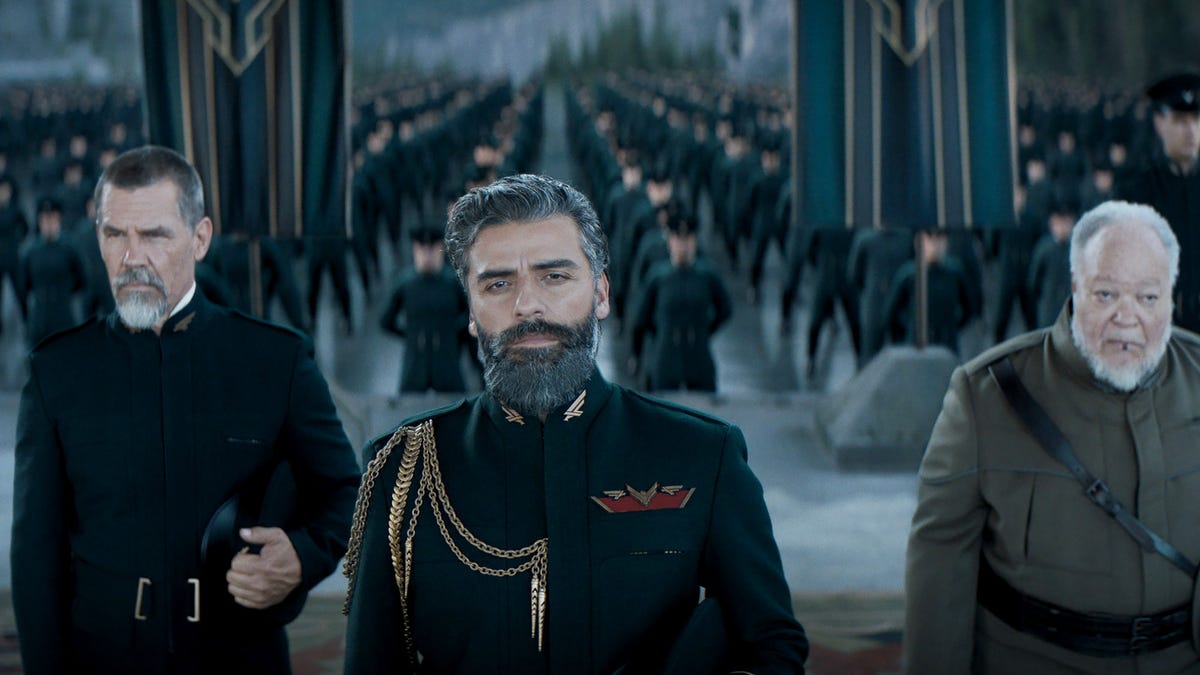
‘Dune: Part Two’ To Pick Up Right Where Viewers Fell Asleep During First One
LAS VEGAS—Debuting the high-budget sequel at this year’s CinemaCon, director Dennis Villeneuve confirmed Wednesday that Dune: Part Two will pick up right where viewers fell asleep during the first one. “I think audiences are going to love this installment, which continues the epic tale from the...
 www.theonion.com
www.theonion.com

Habemus trailer de verdade.
Níra
Usuário
Adiaram pra 2024 
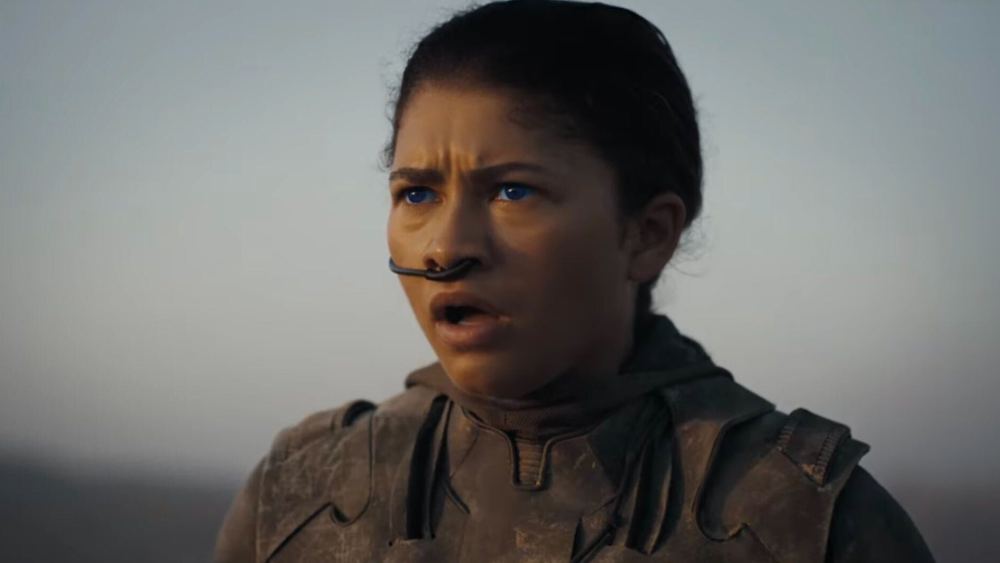
 variety.com
variety.com


‘Dune: Part Two’ Delayed to 2024 Amid Strikes
“Dune: Part Two” has been delayed to 2024. The story of Paul Atreides, played by Timothée Chalamet, will be continued on March 15. Warner Bros. made the announcement Thursday after Vari…
2024 é logo ali.
Adoro trailers que resumem o filme inteiro.
#SQN
dermeister
Ent cara-de-pau
E não é que ele dá um monte de pontos visualmente fortes do filme de graça mesmo?! Putzgrilla, mostram até um monte de cenas longas e bem contextualizadas do:
Mas o hype só aumentou aqui. Essa segunda/terceira parte é bem mais difícil de adaptar e se não fosse o Villeneuve aí eu estaria com muito muito medo.
ataque contra Arrakeen com os vermes!
Mas o hype só aumentou aqui. Essa segunda/terceira parte é bem mais difícil de adaptar e se não fosse o Villeneuve aí eu estaria com muito muito medo.
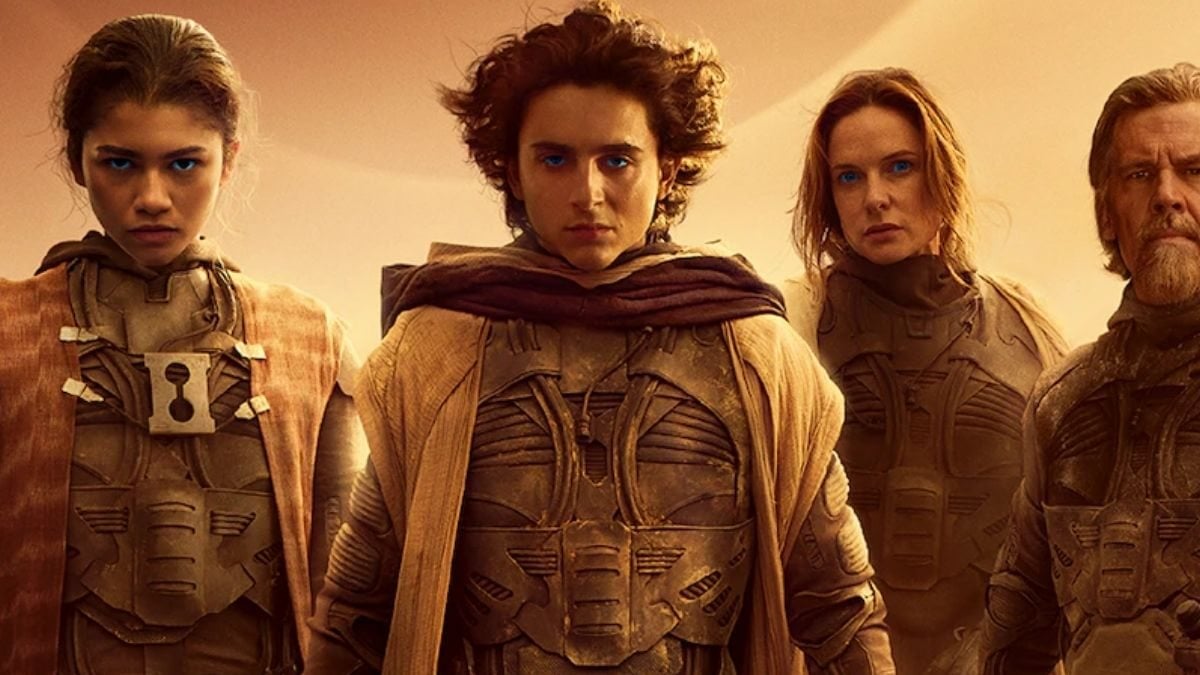
Duna: Parte 2 ganha novo pôster oficial
A Warner Bros. divulgou um novo pôster oficial de Duna: Parte 2.
 ovicio.com.br
ovicio.com.br
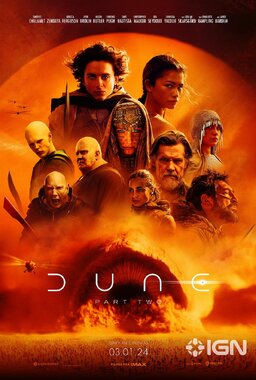
Ilmarinen
Usuário
Crítica especializada está BABANDO horrores no Duna parte 2 do Villeneuve.
Íntimo e ameaçador como nenhum outro blockbuster existente. (…) Existem momentos que parecem tão audaciosos que se desenrolam como se já estivessem gravados no cânone cinematográfico. Timothée Chalamet, Zendaya e um Austin Butler rosnante acrescentam poder estelar a uma obra de imersão total sensorial e imaginativa. Como a Parte 2 deixa claro, Villeneuve não terminou seu trabalho com Duna, mesmo que já tenha deixado sua marca na história da ficção científica. Agora, a pergunta mais intrigante é: o que vem a seguir?”.
"Duna: Parte 2" é elogiado pela crítica e estreia com 97% de aprovação no Rotten Tomatoes
Vem muito aí! "Duna: Parte 2" recebe diversos elogios da crítica internacional e tem tudo para se tornar o destaque do ano. Confira!
 radiomixfm.com.br
radiomixfm.com.br
Duna: Parte 2 quebra recordes de aprovação com Denis Villeneuve
Leia a matéria completa no nosso parceiro Filmes - O Vício Leia mais em Filmes - O Vício • Vilões do Homem-Aranha protagonizarão nova animaçã...
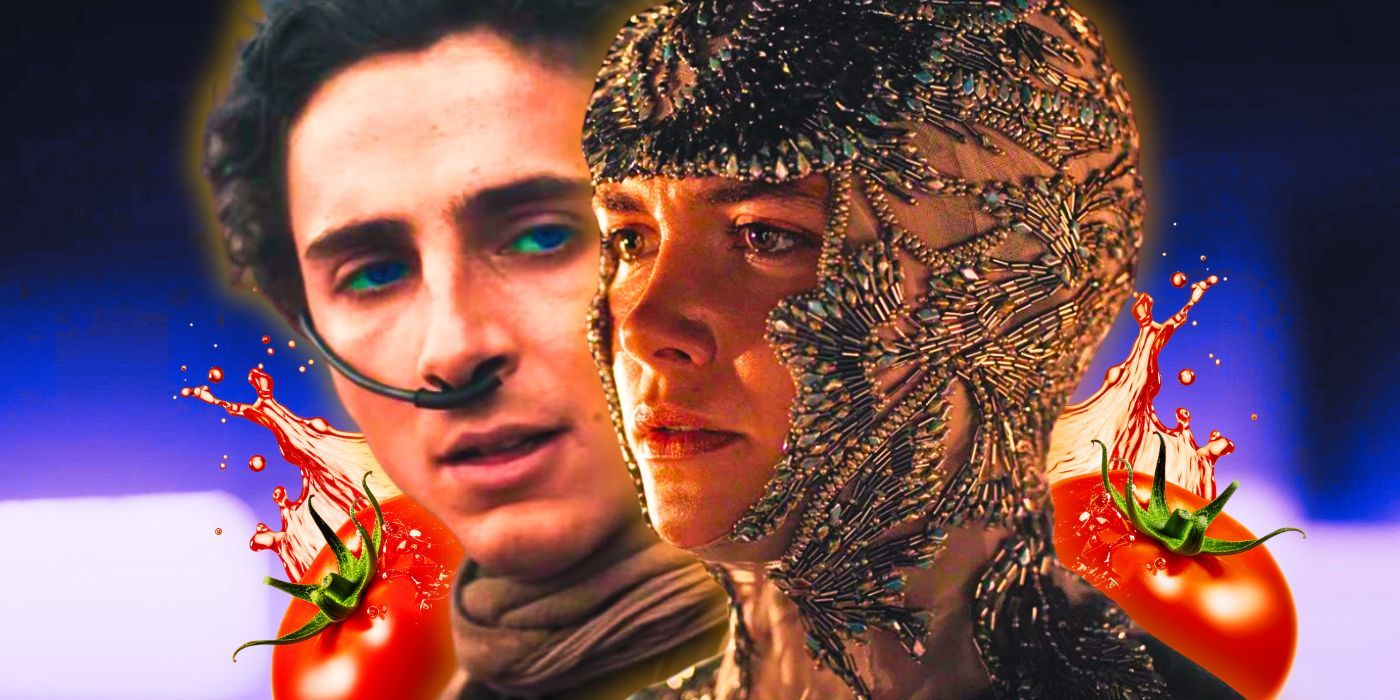
Dune 2's Rotten Tomatoes Score Breaks 10 Records
Dune 2's Rotten Tomatoes score is impressive.
Última edição:
Tenho de ver. ^___^
Ilmarinen
Usuário
Capaz de papar muitos Oscars ano que vem. Feito um Shai Hulud na seca.
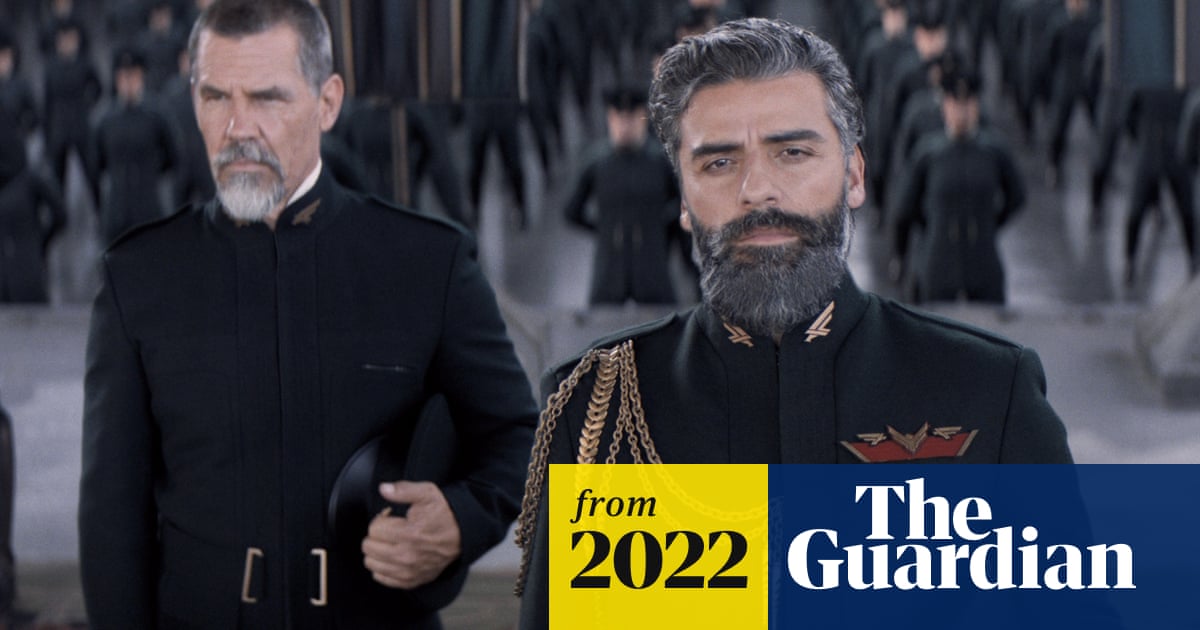
 www.theguardian.com
www.theguardian.com

Can Dune: Part Two follow Lord of the Rings to win best picture Oscar?
Part one of Denis Villeneuve’s sci-fi epic swept all the technical awards at this year’s Academy awards – might part two become the second fantasy movie to win the ‘major’ one?
This article is more than 1 year old
Can Dune: Part Two follow Lord of the Rings to win best picture Oscar?
This article is more than 1 year old
Part one of Denis Villeneuve’s sci-fi epic swept all the technical awards at this year’s Academy awards – might part two become the second fantasy movie to win the ‘major’ one?
Ben Child
@BenChildGeek
Fri 1 Apr 2022 09.54 BSTLast modified on Fri 1 Apr 2022 09.55 BST
https://www.theguardian.com/film/20...best-picture-oscar-lord-of-the-rings#comments
0
The six Oscars picked up by Denis Villeneuve’s Dune on Sunday night in Los Angeles might not seem like a bad haul, especially given no other movie managed to garner more than three. And yet such technical categories as cinematography, editing, score, visual effects, production design and sound are not usually considered to be among the major prizes, even if the movie’s spectacular achievements in all these essential disciplines were critical to making it such a splendid feast for the senses on the big screen.
Dune was one of 2021’s biggest critical smashes, but in many ways its failure to pick up any awards for acting, direction or producing tally with a sense that the first episode in Villeneuve’s space saga relied more on spectacle and epic sweep than the traditional Oscar virtues of pathos and big-hearted warmth. It is a movie that glues your eyes to the screen, so rapid is the action, so electrifying are the fight scenes, yet it is not likely to ever make someone shed a tear, or recommend it to a disheartened friend who needs to rediscover their inner mojo. Driving Miss Daisy, or The Help it is not.
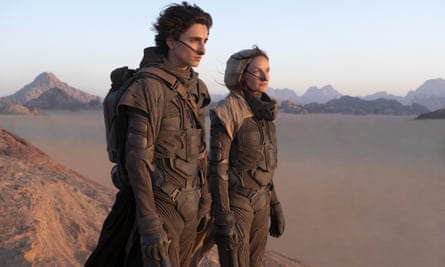
Desert hearts … Timothée Chalamet and Rebecca Ferguson in Dune. Photograph: Chia Bella James/AP
Might the Academy end up rewarding Villeneuve with major prizes once Dune: Part Two hits multiplexes in October 2023? Something similar happened nearly 20 years ago, when Peter Jackson had to wait for 2003’s Return of the King to doff its feathered cap during awards season. Prior to that film, Jackson’s previous two Lord of the Rings episodes had picked up only five gongs at two different ceremonies, and all in technical categories. At the 2004 Academy Awards, Return of the King almost swept the board with a staggering 11 Oscars – a joint record with Titanic and Ben-Hur that it still holds to this day. It also became the first fantasy film to win the best picture prize.
Dune review – Denis Villeneuve’s awe-inspiring epic is a moment of triumph
https://www.theguardian.com/film/20...ves-awe-inspiring-epic-is-a-moment-of-triumph
https://www.theguardian.com/film/20...ves-awe-inspiring-epic-is-a-moment-of-triumph
https://www.theguardian.com/film/20...ves-awe-inspiring-epic-is-a-moment-of-triumph
Read more
Dune (part one) is already well ahead of where Jackson was at this stage, so might the Academy hold back its major prizes for the second instalment? Much of that perhaps depends on whether Part Two hits the kind of emotional high notes that the New Zealand film-maker strummed throughout his extended foray into Middle Earth.
Villeneuve is more than capable of imbuing futuristic fantasies with gorgeously intense moments of wonder, as his dazzling but deeply human alien-encounter flick Arrival proved beyond doubt. And it is hardly a shock that Dune’s first episode never quite zoomed to the stirring levels of, say, Gandalf’s fall into darkness in the Mines of Moria during The Fellowship of the Ring. JRR Tolkien always intended his 1954-55 epic high-fantasy saga as a three-part journey, and therefore ensured each section featured its own powerful climax.
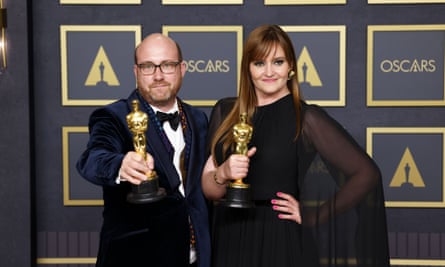
Set in sand … Dune’s production designers Patrice Vermette and Zsuzsanna Sipos with their Oscars. Photograph: John Angelillo/UPI/REX/Shutterstock
Frank Herbert’s Dune, on the other hand, is not split so easily in two. Moreover, it is essentially the story of a wronged scion who (spoiler alert for those who have not read the full Dune series) eventually discovers that with great power comes Putin-like levels of megalomania. There is a more complex emotional arc here than the one of warm-hearted homunculi battling to save the world from evil presented by Tolkien. It was never likely to be a project that connected with mainstream audiences in the same way Lord of the Rings did. It seems unlikely then, that Villeneuve and his team only need hold on until Part Two to see Dune finally grab the key Oscar gongs it perhaps deserves. Unless that second episode can go beyond giant space worms, witchy cults and warring dynasties, and give us a little bit more human joy and red-blooded awe. The first part taught us that one’s eyes turn a cold and distant blue after chowing down on too much “spice”: it may be a lot to ask, given the icy nature of Herbert’s space saga, but if it is to triumph at the Oscars, Part Two will probably need to show Timothée Chalamet’s Paul Atreides glowing with something a little more heartfelt.
Última edição:
Fúria da cidade
ㅤㅤ ㅤㅤ ㅤㅤ
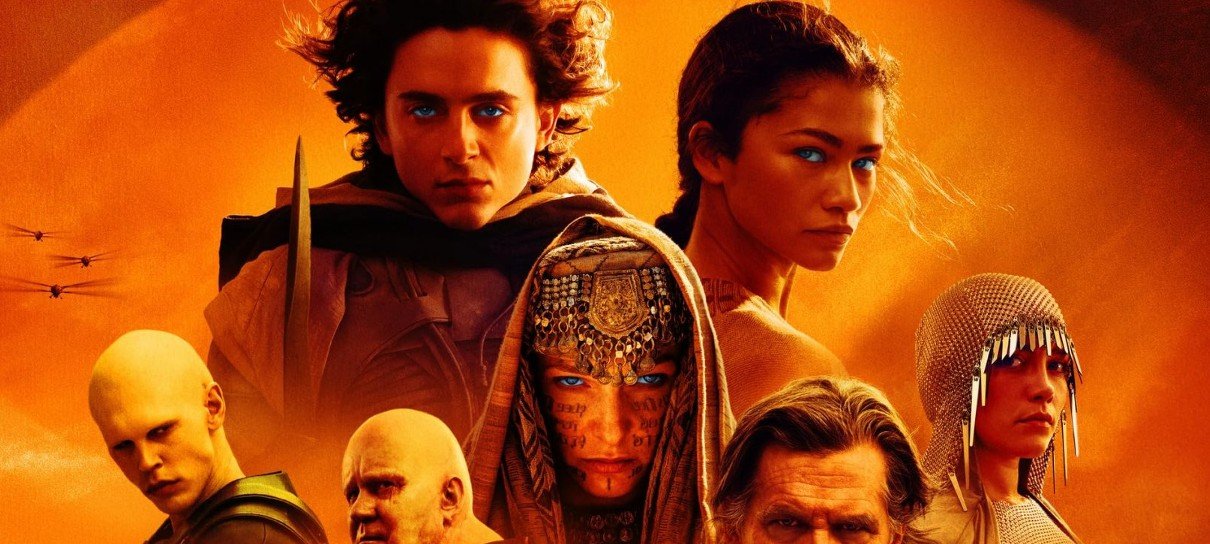
Duna 2 pode bater US$ 170 milhões em bilheteria de estreia, aponta projeção - NerdBunker
Duna: Parte Dois deve bater US$ 170 milhões globais na bilheteria de estreia e pode se firmar como primeiro grande lançamento do ano
Ragnaros.
Usuário
Não assisti Duna - Parte 2, mas o meu grande medo é terem transformado Paul Atreides num herói.
Frank Herbert escreveu o livro como um alerta sobre os líderes carismáticos, e como o povo entrega sua liberdade, seu senso crítico e até sua vida em prol desses salvadores.
Mas, pensando bem, acho Deni Villeneuve competente suficiente para não cair nessa armadilha.
Na minha opinião, o melhor canal de Youtube que trata de Duna (livros, filmes, minissérie). Essa análise a respeito de Paul é uma das melhores abordagens que já vi sobre um personagem da literatura:
Frank Herbert escreveu o livro como um alerta sobre os líderes carismáticos, e como o povo entrega sua liberdade, seu senso crítico e até sua vida em prol desses salvadores.
Mas, pensando bem, acho Deni Villeneuve competente suficiente para não cair nessa armadilha.
Na minha opinião, o melhor canal de Youtube que trata de Duna (livros, filmes, minissérie). Essa análise a respeito de Paul é uma das melhores abordagens que já vi sobre um personagem da literatura:
Última edição:
Ilmarinen
Usuário
Eu confio no Villeneuve até pq sua intenção é adaptar toda a trajetória até o Messias de Duna ( e dali pra frente sabe-se lá o que pode vir *). O problema do Paul Atreides é que ele atravessa todo o trajeto que vai de um Eärendil até um Ar-Pharazôn e de volta pra um Tar- Palantir por intenção do próprio autor dos livros...
*
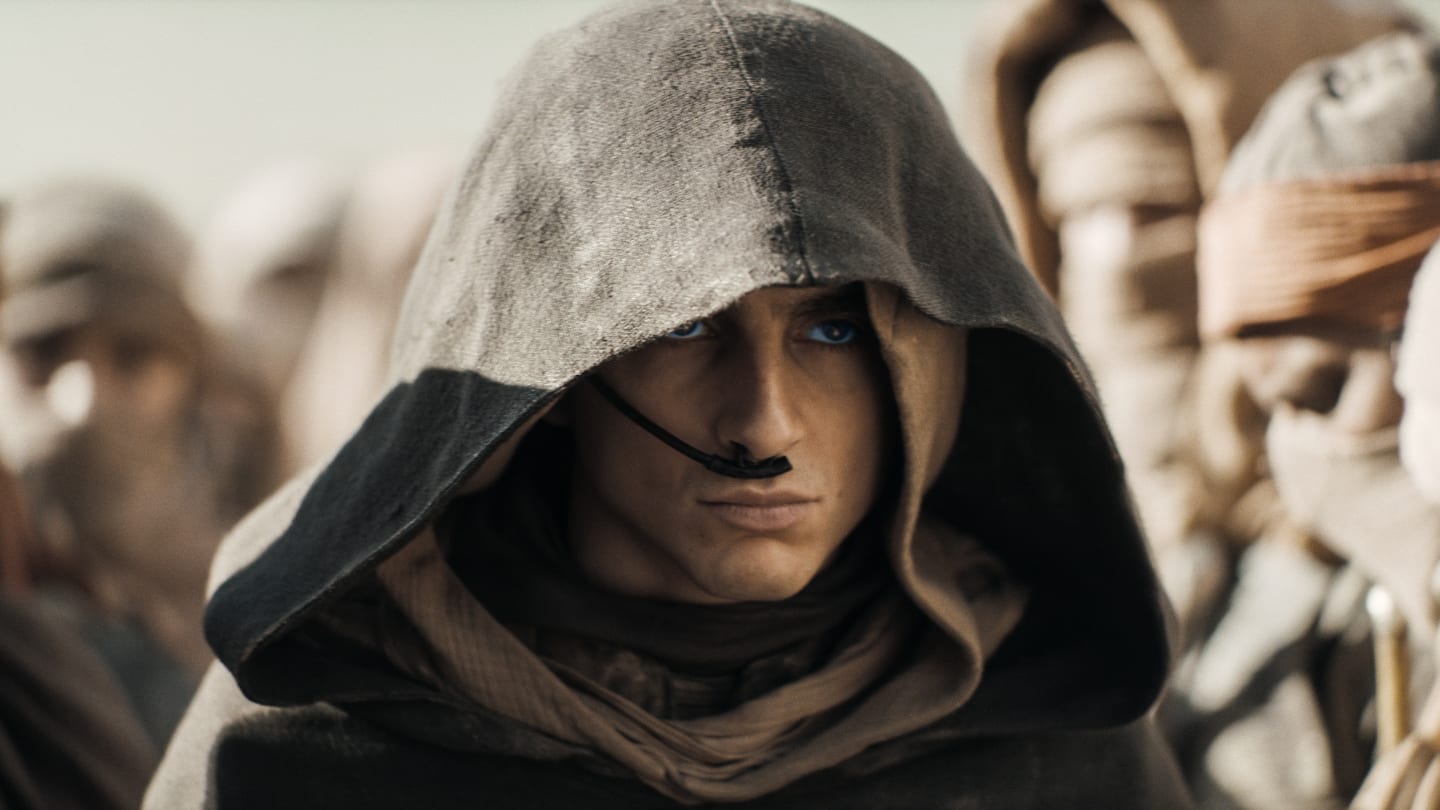
 winteriscoming.net
winteriscoming.net
Motivo em função do qual MUITA gente costuma rejeitar as sequências que o próprio Herbert fez.
O próprio autor deixou muito claro sua aversão pelo CONCEITO do herói divinizado em si mesmo ( e seu impacto sobre as massas) mais até do que sua necessidade de enfatizar a falibilidade do próprio Paul Atreides enquanto personagem:
A Kristen Brennan do Star Origins resumiu isso tudo muito bem quando escreveu sobre o Paul Atreides e a posição de Herbert em relação a ele (citando o próprio autor, inclusive ):
*

Denis Villeneuve won't direct a Children of Dune movie, but someone should
Director Denis Villeneuve has done what many for years thought was impossible: adapted Frank Herbert's 1965 novel Dune into a coherent movie that has people exc
Motivo em função do qual MUITA gente costuma rejeitar as sequências que o próprio Herbert fez.
O próprio autor deixou muito claro sua aversão pelo CONCEITO do herói divinizado em si mesmo ( e seu impacto sobre as massas) mais até do que sua necessidade de enfatizar a falibilidade do próprio Paul Atreides enquanto personagem:
HERBERT: There is definitely an implicit warning, in a lot of my work, against big government . . . and especially against charismatic leaders. After all, such people-well-intentioned or not-are human beings who will make human mistakes. And what happens when someone is able to make mistakes for 200 million people? The errors get pretty damned BIG!
For that reason, I think that John Kennedy was one of the most dangerous presidents this country ever had. People didn't question him. And whenever citizens are willing to give unreined power to a charismatic leader, such as Kennedy, they tend to end up creating a kind of demigod . . . or a leader who covers up mistakes—instead of admitting them—and makes matters worse instead of better. Now Richard Nixon, on the other hand, did us all a favor.
PLOWBOY: You feel that Kennedy was dangerous and Nixon was good for the country?
HERBERT: Yes, Nixon taught us one hell of a lesson, and I thank him for it. He made us distrust government leaders. We didn't mistrust Kennedy the way we did Nixon, although we probably had just as good reason to do so. But Nixon's downfall was due to the fact that he wasn't charismatic. He had to be sold just like Wheaties, and people were disappointed when they opened the box.
I think it's vital that men and women learn to mistrust all forms of powerful, centralized authority. Big government tends to create an enormous delay between the signals that come from the people and the response of the leaders. Put it this way: Suppose there were a delay time of five minutes between the moment you turned the steering wheel on your car and the time the front tires reacted. What would happen in such a case? -
A Kristen Brennan do Star Origins resumiu isso tudo muito bem quando escreveu sobre o Paul Atreides e a posição de Herbert em relação a ele (citando o próprio autor, inclusive ):
Paul Atreides
: The name Paul is taken from Paul the Apostle. Herbert said "He is every prince who ever went in search of the Holy Grail." Atreides literally means "the son of Atreus"; Paul is directly descended from Agamemnon Atreides, a hero from The Iliad (written around 850 BCE). Paul is the most perfect, powerful superhuman Herbert could imagine because he wanted to communicate what he saw as the central theme of Dune, that "superheroes are disastrous for humankind." Dune is a warning to mankind: "Don't give over all of your critical faculties to people in power, no matter how admirable those people may appear to be." Why not? "Beneath the hero's facade you will find a human being who makes human mistakes. Enormous problems arise when human mistakes are made on the grand scale available to a superhero."
E aí está o que o próprio Herbert disse:Perhaps more importantly, "Even if we find a real hero (whatever-or whoever-that may be), eventually fallible mortals take over the power structure that always comes into being around such a leader." This is dangerous because "It is demonstrable that power structures tend to attract people who want power for the sake of power and that a significant proportion of such people are imbalanced - in a word, insane." Herbert drew examples of larger-than-life heroes from Hitler, Churchill, Franklin Roosevelt, Stalin, Mussolini, and especially John F. Kennedy and George Patton, who he believed consciously "fitted themselves into the flamboyant Camelot pattern."
Última edição:
Tópicos similares
- Respostas
- 26
- Visualizações
- 589
- Respostas
- 3
- Visualizações
- 285
Compartilhar:
